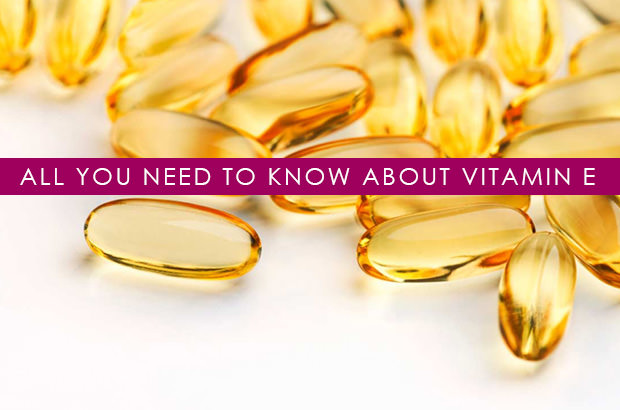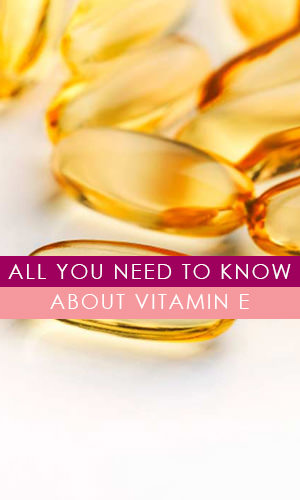
All You Need To Know About Vitamin E
Posted on 26 Apr, 2020

What Is Vitamin E?
Vitamin E is a powerful, fat-soluble antioxidant that helps protect cell membranes against damage caused by free radicals and prevents the oxidation of LDL cholesterol. The term vitamin E encompasses a group of eight compounds, called tocopherols and tocotrienols, that comprise the vitamin complex as it is found in nature.
The Benefits Of Vitamin E
Heart Health
 Vitamin E is necessary for structural and functional maintenance of skeletal, cardiac, and smooth muscle. It also assists in the formation of red blood cells and helps to maintain stores of vitamins A and K, iron, and selenium. Vitamin E thins the blood and prevents blood platelets from clumping. High levels of vitamin E reduce the risk of sunstroke and coronary artery disorder or heart disease.
Vitamin E is necessary for structural and functional maintenance of skeletal, cardiac, and smooth muscle. It also assists in the formation of red blood cells and helps to maintain stores of vitamins A and K, iron, and selenium. Vitamin E thins the blood and prevents blood platelets from clumping. High levels of vitamin E reduce the risk of sunstroke and coronary artery disorder or heart disease.
Antioxidative Properties
Most of the health benefits of vitamin E come from its antioxidant properties. Antioxidants remove free radicals — the unstable compounds that damage the cell structure. Another important benefit of vitamin E is that it reduces cholesterol and the risk of developing cancer. It can also help relieve symptoms of Alzheimer's disease, and may help prevent some diabetes-related damage, particularly to the eyes.
Skin and Hair Care
 A major benefit of vitamin E oil for the skin is that it helps the healing process. As vitamin E is absorbed by the epidermis layer of the skin, it can be used for treating sunburn or protecting you from the sun. Vitamin E oil benefits the skin by helping it retain its natural moisture content.
A major benefit of vitamin E oil for the skin is that it helps the healing process. As vitamin E is absorbed by the epidermis layer of the skin, it can be used for treating sunburn or protecting you from the sun. Vitamin E oil benefits the skin by helping it retain its natural moisture content.
Another widely known health benefit of vitamin E is in hair care. Owing to its antioxidant properties, vitamin E promotes the circulation of blood to the scalp. Vitamin E helps alleviate fatigue and strengthen capillary walls while nourishing cells.
Lastly, vitamin E can be used to treat scars, acne, and wrinkles because it speeds up cell regeneration. This creates an anti-aging effect, which makes the skin look younger.
Recommended Daily Intake
Most individuals in the United States are believed to obtain sufficient vitamin E from dietary sources, although individuals with very-low-fat diets or intestinal malabsorption disorders may require supplementation.
The Recommended Dietary Allowances (RDA) according to the National Institute of Health are as follows:
| Men or women older than 14 years old | 15 milligrams |
| Pregnant women of any age | 15 milligrams |
| Breastfeeding women of any age | 19 milligrams |
| Children 1-3 years | 6 mg |
| Children 4-8 years | 7 mg |
| Children 9-13 years | 11 mg |
What Are The Signs Of Vitamin E Deficiency?
Vitamin E deficiency is rare in humans. People who cannot absorb dietary fat or who have rare disorders of fat metabolism cannot absorb vitamin E. Premature or very low birth weight infants and individuals with rare genetic abnormalities in the alpha-tocopherol transfer protein may also be at risk. Symptoms include greasy stools, chronic diarrhea and an inability to secrete bile.
How Do You Get Enough Vitamin E From Foods?
Good food sources of vitamin E include vegetable oils, avocados, spinach, sunflower seeds, wheat germ, nuts, and whole grains.
Are There Any Risks Associated With Too Much Vitamin E?
Except for an anticoagulant effect, vitamin E has no known toxicity or side effects. Vitamin E in very high doses may interfere with the body's ability to clot blood, posing a risk to people already taking prescribed blood thinners.
What Are Some Special Considerations With Regards To Vitamin E
- Because vitamin E is fat-soluble, it's best absorbed when taken with a meal containing some fat.
- Vitamin E loses its potency when exposed to air, heat, and light, so supplements should be stored in a dark, cool place.
- People who are taking anticoagulants (blood thinners or aspirin) should take vitamin E supplements only under physician supervision.
- If you are taking statins, do not exceed 800 IU of vitamin E because it can dramatically reduce the benefits of some cholesterol drugs.
- Adverse effects may also occur when taking vitamin E and chemotherapy drugs, or mineral oil.
- Vitamin E absorption may be altered when taking the pharmaceuticals Cholestyramine, Colestipol and Orlistat.
- Levels of vitamin E may be affected by seizure medications, zinc and fish oils.
- High doses of vitamin E may increase the body's vitamin K requirement, and increased intake of omega-6 fatty acids may increase vitamin E requirements.
Books Nutritionists Recommend

by David Perlmutter

by Michael Pollan

by Robin Jeep

by Mariza Snyder

 Why Going To The Gym Can Be Unhealthy For You
Why Going To The Gym Can Be Unhealthy For You Which Is Healthier? Red Or White Onions
Which Is Healthier? Red Or White Onions 6 Tips for Going Vegetarian
6 Tips for Going Vegetarian The Weirdest Superfoods And How To Consume Them
The Weirdest Superfoods And How To Consume Them










